

How to wash cloth diapers. No matter what type of cloth diaper you use, they'll need washing so you can use them over and over again.
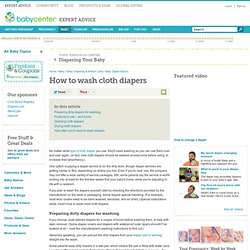
(In fact, new cloth diapers should be washed at least once before using, to increase their absorbency.) One option is paying a diaper service to do the dirty work, though diaper services are getting harder to find, depending on where you live. Even if you're near one, the company may not offer a wide variety of service packages. Still, some parents say the service is worth looking into at least for the first few weeks that your baby's home, while you're adjusting to life with a newborn.
If you plan to wash the diapers yourself, start by checking the directions provided by the manufacturer on the label or packaging. Preparing dirty diapers for washing If you choose, soak stained diapers for a couple of hours before washing them, to help with stain removal. Generally speaking, you can just put the dirty diapers from your diaper pail or wet bag straight into the wash. InfantRisk Center. International Lactation Consultant Association - International Lactation Consultant Association.
HMBANA. iBreastfeeding.com. Breastfeeding Online. AAP.org. KellyMom : evidence-based breastfeeding and parenting. How Many Calories are Burned While Chewing? Breast Versus Bottle: How much milk should baby take? Q: Why does my breastfed baby take at most 4 ounces (120 mL) from the bottle when my neighbor’s formula-fed baby takes 7 or 8 ounces (210-240 mL)?
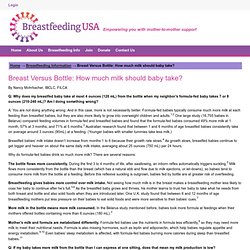
Am I doing something wrong? A: You are not doing anything wrong. And in this case, more is not necessarily better. What are the risks associated with formula fe... [Breastfeed Rev. 2010. The Risks of Not Breastfeeding for Mothers and Infants. The WHO Child Growth Standards. Growth Charts - 2000 CDC Growth Charts - United States. Links. La Leche League International makes every effort to ensure that web sites directly linked to our own include information compatible with our mission and purpose.
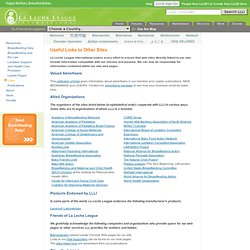
We can only be responsible for information contained within our own web pages. Valued Advertisers This collection of links gives information about advertisers in our member and Leader publications, NEW BEGINNINGS and LEAVEN. Contact our advertising manager to see how your business could be listed here. Allied Organizations The organizers of the sites listed below (in alphabetical order) cooperate with LLLI in various ways. Products Endorsed by LLLI In some parts of the world, La Leche League endorses the following manufacturer's products: Lansinoh Laboratories Friends of La Leche League We gratefully acknowledge the following companies and organizations who provide space for our web pages or other services LLL provides for mothers and babies.
BabysGarden helped create Chinese Web pages for our site. Other Useful Links. Breastfeeding Law: Federal Law. Notwithstanding any other provision of law, a woman may breastfeed her child at any location in a Federal building or on Federal property, if the woman and her child are otherwise authorized to be present at the location.
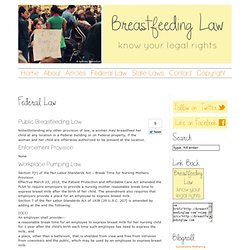
None Section 7(r) of the Fair Labor Standards Act – Break Time for Nursing Mothers Provision Effective March 23, 2010, the Patient Protection and Affordable Care Act amended the FLSA to require employers to provide a nursing mother reasonable break time to express breast milk after the birth of her child. The amendment also requires that employers provide a place for an employee to express breast milk. Section 7 of the Fair Labor Standards Act of 1938 (29 U.S.C. 207) is amended by adding at the end the following: How Much Weight will my Breastfeeding Baby Gain? How much weight should I expect my breastfeeding baby to gain?
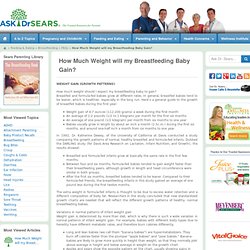
Breastfed and formula-fed babies grow at different rates. In general, breastfed babies tend to be leaner, which is healthier, especially in the long run. Here’s a general guide to the growth of breastfed babies during the first year: Weight gain of 4-7 ounces (112-200 grams) a week during the first monthAn average of 1-2 pounds (1/2 to 1 kilogram) per month for the first six monthsAn average of one pound (1/2 kilogram) per month from six months to one yearBabies usually grow in length by about an inch a month (2.5c.m.) during the first six months, and around one-half inch a month from six months to one year.
In 1992, Dr. The extra weight in formula-fed infants is thought to be due to excess water retention and a different composition of body fat. Variations in normal patterns of infant weight gain Weight gain is determined by more than diet, which is why there is such a wide variation in normal patterns of infant weight gain. Average Weight Gain for Breastfed Babies. © Miroslav Beneda - Fotolia.com See also the Infant growth calculators and breastfed baby growth charts @ A few things to keep in mind when evaluating weight gain A 5-7% weight loss during the first 3-4 days after birth is normal.
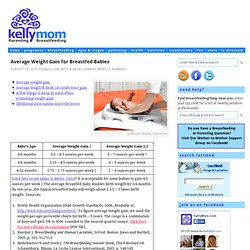
A 10% weight loss is sometimes considered normal, but this amount of weight loss is a sign that the breastfeeding needs to be evaluated.